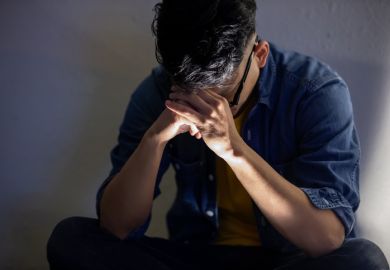Yale University is seeking compromise in a lawsuit alleging mistreatment of students with mental health issues, aiming to moderate what experts regard as a historically hard stance amid an increasingly complicated set of choices for US higher education.
The lawsuit, brought in federal court by current and former Yale students, contends that the Ivy League institution has routinely discriminated against students with mental health challenges by pushing them to withdraw and then hindering their return.
Yale has put forth a series of responses in recent weeks, arguing that it complies with all applicable laws and regulations, promising policy changes to be even more responsive and – most recently – winning a postponement of the legal process to allow talks on a settlement.
The dispute comes at a time when US higher education is consumed by high rates of student mental health challenges, apparently exacerbated by pandemic-related restrictions on personal interactions.
Nearly half of all US college students are understood to be suffering from some form of anxiety and depression, said one expert, Miriam Heyman, a senior research associate at the Lurie Institute for Disability Policy at Brandeis University.
“We’re also seeing, across the board, that campuses haven’t figured out how to support their students,” she said. “And as a default, they’re resorting to these exclusionary policies to get the students home.”
The problem is likely worse at elite and high-pressure campuses such as Yale, said Dr Heyman, author of a 2018 study that looked at the eight Ivy League institutions and called them all failures in terms of their policies for imposing leaves of absence on students with mental illness.
Measured against its peer institutions, Dr Heyman said, “I don’t think that Yale is an outlier.”
In fact, said another expert, Victor Schwartz, the senior associate dean for wellness and student life at the City University of New York, right-sizing mental health care is a difficult topic across US higher education – with great levels of nuance and variation.
Yale does have “a very longstanding traditional hardcore stance on leaves of absence that, at this point, probably puts it somewhere outside the mainstream”, Dr Schwartz said. At the same time, “they’re providing a tonne of services to a lot of students”, he said. “We don’t hear about all the situations that get resolved well and to everybody’s satisfaction – we hear about the cases that are problematic or resulted in conflict.”
The lawsuit against Yale has three named plaintiffs, including Rachael Shaw-Rosenbaum, a fresher who died by suicide last year after worrying about the possibility of being forced to withdraw from Yale because of her mental health challenges.
Another is Hannah Neves, an undergraduate from Brazil who was hospitalised after a suicide attempt in 2020 and said that three Yale administrators visited her urging her to withdraw from the university, which under federal law would require her to leave the US within 15 days.
There’s a combination of reasons why some situations might turn out badly, Dr Schwartz said, including the complications of bureaucracies, and variations in how individual staff handle particular cases.
“Sometimes it’s not the policies that are problematic; certain people are just more hard-line than others,” he said.
paul.basken@timeshighereducation.com
If you’re having suicidal thoughts or feel you need to talk to someone, a free helpline is available around the clock in the UK on 116123, or you can email jo@samaritans.org. In the US, the National Suicide Prevention Lifeline is 1-800-273-8255. In Australia, the crisis support service Lifeline is 13 11 14. Other international suicide helplines can be found at www.befrienders.org.
Register to continue
Why register?
- Registration is free and only takes a moment
- Once registered, you can read 3 articles a month
- Sign up for our newsletter
Subscribe
Or subscribe for unlimited access to:
- Unlimited access to news, views, insights & reviews
- Digital editions
- Digital access to THE’s university and college rankings analysis
Already registered or a current subscriber?








